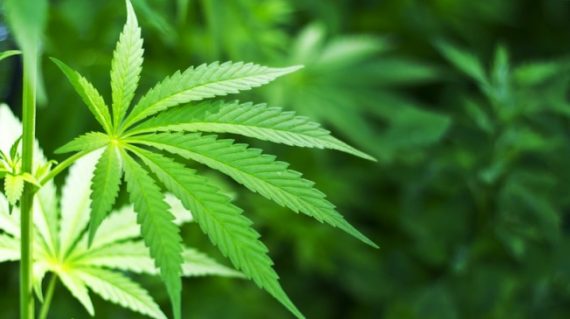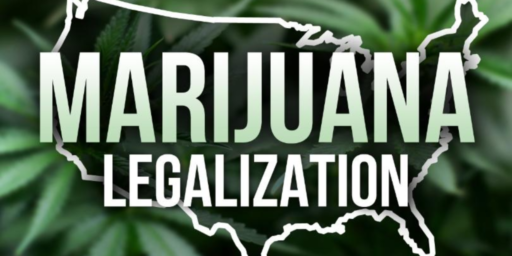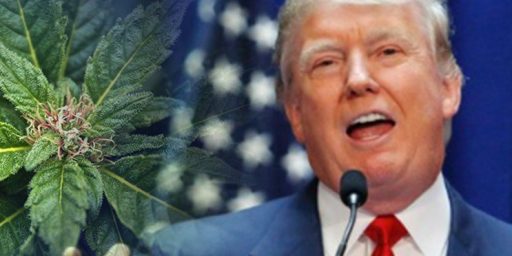California, Four Other States, Set To Vote On Marijuana Legalization
If polls are any indication, voters are set to legalize marijuana in five more states on Tuesday.
In addition to the Presidential election, Congressional elections, and various Governorships and state legislatures, Election Day will see its usual number of ballot initiatives, including several proposals to decriminalize or fully legalize marijuana in several parts of the country:
Voters are poised to give a sweeping endorsement of legalizing marijuana, with ballot measures in five states on the verge of passing on Election Day, potentially setting the stage for loosening federal controls on the drug.
California — home to 40 million people and the world’s sixth-largest economy — is likely to relax its restrictions on pot for recreational use, according to the latest polls. And similar measures in Arizona, Maine, Massachusetts and Nevada also have slight leads. Supporters believe a California victory, let alone a sweep in all five states, could be what they need to change the federal discussion about the drug, which is currently on par with heroin under U.S. law.
“I’ve been calling 2016 the game-over year,” said Bill Piper of the Drug Policy Alliance, a pro-legalization group. “Because if California wins, that’s going to put enormous pressure on Congress to end marijuana prohibition. If all five win, that’s even better. If California legalizes, it’s going to become much harder for Congress not to do anything.”
Supporters of looser pot laws clearly have the momentum when it comes to public opinion. A new Gallup poll found that 60 percent of Americans, including around two in five Republicans, support legalized marijuana now — up from about 25 percent two decades ago, around the time California legalized it for medical use.
Colorado and Washington became the first states to legalize recreational marijuana just four years ago, and were joined by Alaska, Oregon and Washington, D.C., two years later.
Voters in another three states — Arkansas, Florida and North Dakota — will consider whether to legalize medical marijuana on Tuesday, while Montana has a ballot measure that would remove restrictions from the state’s current medical marijuana law. Success in those states would make medical marijuana legal in a clear majority of states.
Even so, the opponents to the marijuana ballot measures — themselves well-funded and well-organized — say that legalization or any measures that make it easier for vendors to get banking services will hardly be a done deal, no matter what happens in November.
Smart Approaches to Marijuana, which has bipartisan backers like former Rep. Patrick Kennedy (D-R.I.) and David Frum, a speechwriter for George W. Bush, has tagged the efforts to expand legalized marijuana as a sequel to “Big Tobacco” — an attempt to prioritize corporate profits over public health.
“The battle for settling the question of legalization will not end this November, or November 2020,” said Kevin Sabet, who worked on drug policy in the Clinton, George W. Bush and Obama administrations and is now the group’s president.
Sabet was equally skeptical that a run of success at the ballot box this month would move Congress to take steps short of legalization anytime soon.
“I don’t foresee Congress moving to make marijuana legal anytime soon,” he said. “California medicalized marijuana 20 years ago — Congress still does not recognize smoked marijuana as medicine. All this talk of a ‘tipping point’ is marijuana business rhetoric.”
The pro-marijuana forces don’t see it that way. Their allies in Congress plan to start just after Election Day with a series of incremental efforts to ease federal restrictions on the marijuana trade.
Lawmakers face a Dec. 9 deadline for passing another government funding bill. Rep. Earl Blumenauer (D-Ore.) said he and other members would push to add a measure championed by Sen. Jeff Merkley (D-Ore.) and Rep. Denny Heck (D-Wash.) that seeks to absolve banks of any punishment for doing business with legal pot dealers.
This isn’t the first election year where propositions dealing with marijuana legalization or decriminalization have been on the ballot, of course. Just six years ago in 2010, a legalization initiative was on the ballot in the nation’s most populous state and was leading in the polls before falling behind and ultimately failing to pass on Election Day. As it turned out, one of the reasons for that failure was because it would have allowed individual jurisdictions to opt in or out of legalization, thus creating a patchwork of legal uncertainty where one could travel from one part of the state to the other and put oneself in legal jeopardy for even possessing a single marijuana cigarette. The result was that many members of the pro-legalization movement opposed the 2010 initiative, as did many members of law enforcement, who argued that the uncertain legal status of marijuana under the proposal would make it harder for them to do their jobs. The version of the law that will be on the ballot Tuesday eliminates that problem by legalizing marijuana statewide. Two years later, though, the legalization movement received a significant boost when Colorado and Washington voters passed initiatives legalizing marijuana, setting in motion a movement that appears to be unstoppable. In 2014, for example, similar initiatives in Washington, D.C, Oregon, and Alaska passed as did several initiatives that either legalized pot for medical purposes or decriminalized it to the point where someone caught with marijuana obviously for personal use rather than trafficking would be issued the equivalent of a traffic ticket rather than charged with a crime. Finally, polling continues to show that support for legalization is growing to the point where support for the idea is well past majority support at this point. The legalization movement did suffer a setback in Ohio last year, but that initiative was controversial even among the pro-legalization crowd due to the fact that it would have created a monopoly for production and cultivation that would have been heavily regulated by the state, something that was opposed by many people who support pot legalization generally. 00………
Successful passage of marijuana legalization initiatives in a third election is likely to help nationwide momentum for the movement significantly, especially if it happens in California, which has been the incubator for many political movements in the past. The issue won’t be fully solved, though, until it is dealt with at the Federal level. Presently, the fact that marijuana remains highly illegal at the Federal level continues to put vendors and customers in states where it has been legalized at the mercy of Federal authorities who, at least so far, have refrained from interfering with states that are experimenting with the idea. That restraint is completely discretionary, though, and could change depending on who is in power at the Justice Department. For example, one could easily see a Republican President and Attorney General changing the policy adopted by the Obama Administration and cracking down on dealers and customers in the states where marijuana has been legalized. A Hillary Clinton Administration, on the other hand, is likely to continue Obama’s policy and let the states experiment on their own, which is how it should be. Ideally, though, what we need is reform on the Federal level, and it could be accomplished without Congress acting at all. Right now, marijuana is classified as a Schedule I drug along with heroin, LSD and other ‘hard drugs,’ something which makes little sense given the fact that pot does not have nearly the same effect on humans that those drugs do and the fact that there are known medical benefits to the active compounds in marijuana for cancer patients and people suffering from glaucoma. If it wanted to, the Drug Enforcement Administration could reclassify pot to a lower status such as Schedule II, which would at least legalize it on the Federal level for medical purposes as long as it’s prescribed by a doctor. The DEA has resisted all attempts to get it make this change, though, so it seems unlikely that it will happen any time soon.
Regardless of Federal policy, though, the movement to legalize pot at the state level is likely to continue moving forward and, eventually, that will have to have some impact on what’s happening in Washington.






Pot would definitely help people live with a President Trump.
asking the DEA to decriminalize pot is a little like asking McDonalds to stop serving fries.
I’ve served as an elected District Attorney in Conservative Texas. Every DA is on a limited budget. We have to make choices. I believe in strict punishment for violent offenders and burglars. I rarely gave probation. Unfortunately we had to deal with all these annoying pot cases. Even when pot users got probation the understaffed probation officers had to make sure they were in by 10PM – I’d rather they checked on sex offenders.]
Revenues are another reason to legalize. The Washington Post reports for 2015 Colorado gained 18,000 pot-related jobs and $2.4 billion in revenue. 2016 will be much better.
Use among teens has not increased both according to surveys from the Denver Post and Federal Government.
It’s best to vote “Yes”.
I wonder if any good research has been done on long term effect of smoking these marijuana cigarettes. I am certainly against prison terms for having this stuff. But I am concerned about just jumping in and giving the impression that it is completely safe and an alternative to tobacco. What about this leading on up to harder drugs ? Where will the legalization line stop ?
@Tyrell:
What we know is:
1) Marijuana does not lead to harder drugs. Not to say pot smokers don’t branch out, but there’s no evidence that pot is any more of an indicator than beer.
2) Unlike alcohol there is no fatal dose for marijuana. You can smoke it all day long and not die or even become sick.
3) It is not physically addictive. It can become a crutch and people can become psychologically dependent – the equivalent not of an alcoholic but of a guy who just drinks too much.
4) There does not appear to be a link to cancer, though more research is needed.
5) It does not appear to cause an increase in accidents. Ask a CHP and he’ll tell you he spots pot smoking drivers not by how reckless they are, but by slowly and cautiously they drive. (That said, I would never drive high.)
6) My favorite: it contains zero calories when smoked, whereas a shot of 80 proof whiskey is 70 plus calories.
7) It does have an effect on ambition in some folks. Seth Rogan seems to be doing just fine smoking ten times what I’d ever do.
8) It’s been legal in the Netherlands for many decades now and the Netherlands seems to be doing just fine.
Conclusion: It’s a mixed bag. It is clearly better than alcohol in every way. On the other hand, it’s not spring water, it is a drug, it can be abused. But the abuse is a much smaller harm than that caused by outlawing it.
@michael reynolds: Thanks for the information. I have found it hard to get a lot of information. Most of what I know came from films they showed us in high school pe/health class.
@Tyrell: I graduated from high school in 1970; by that time, none of the students believed what the movies about pot told them and had personal experience on which to base their opinions, so my health teacher didn’t show any of them.
I’m convinced that Tyrell is a performance art of what a white guy from the 1950s would say if they were teleported into the modern era…
@Tyrell:
Fact of the matter is they call Oxycontin “hillbilly heroin” for a reason. Legal drugs are already heavily abused so it’s not like further legalization will matter.
Personally I have no issue with legalizing cocaine, LSD, mushrooms and some other drugs. Heroin is already legal as it’s called diamorphine when used in a medical setting for pain relief.
Having said that stuff like meth, black tar, and such are clearly bad enough to never warrant legalization.
On the flip side I’ve talked to high school and middle school kids who thought that popping vicadins all day was perfectly healthy because it’s legal. Then there are the kids who don’t believe anything because they were told all this ridiculous stuff about pot in DARE and none of it turned out to be true.
We need a reality based drug education system for kids not this fearmongering stuff that causes more harm than nothing…
@Just ‘nutha ig’rant cracker: Our high school must have been behind a few years. But then again alcohol is still not allowed in our town; voted down once again a few years ago.